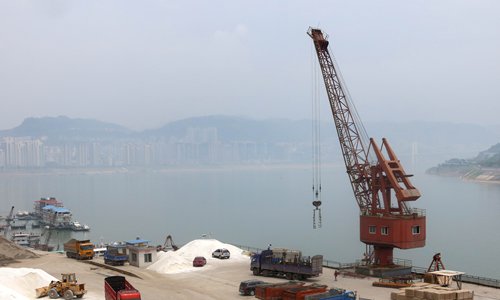Export control law to affect rare earths, UAVs
By Xie Jun and Li Xuanmin Source: Global Times Published: 2020/11/30 19:38:40
Measure provides deterrent in talks with US

Rare earths are unloaded at a port in Southwest China's Chongqing on May 9 Photo: IC
A new Chinese law that takes effect on Tuesday will restrict exports of controlled items, which experts said will increase market supply volatility of some products and technologies, like rare earths and unmanned aerial vehicles (UAVs), although a plunge in exports is unlikely in the near term.
They argued that the new law could be a bargaining chip for China in future China-US trade negotiations, as Beijing will have legal tools to take countermeasures in the face of repeated sanctions imposed by Washington.
The law, passed by the country's top legislative body in October, stipulates that China will impose restrictions or bans on exports of military and nuclear products, as well as other goods, to protect the national interest and security. Technologies, services and data related to the controlled items will also be affected.
The government has not elaborated on what specific items or technologies will be restricted.
Exporters of controlled items will have to apply to the Chinese government for an export license. Companies that export restricted products without a license can be fined five to 10 times the amount involved in such malfeasance.
The law takes effect after years of twists and turns in China-US trade relations, with many Chinese companies facing crackdowns by the US in the name of protecting US national security.
Although the actual impact of the new law on China's exports is yet to become clear, it has already sent ripples through certain industries, such as inflating rare-earth prices, as the market reads the measure as a sign that China will restrict rare-earth exports to the US. Traditionally, the US has been reliant upon importing rare earths, which can be used to produce weapons like tanks and missiles, from China.
The law has helped fuel rapid gains of rare-earth metals, in particular those used for making rare-earth permanent magnets, a manager of a large state-owned rare-earth magnet maker, based in Ganzhou, East China's Jiangxi Province, who spoke on condition of anonymity, told the Global Times.
"Orders for China's rare-earth magnets have surged since mid-year but the supply of rare-earth minerals in the Chinese market cannot meet demand," the manager said. He noted that the tight supply could affect China's rare-earth exports, but a drastic fluctuation is unlikely as the country follows WTO rules.
Zhou Shijian, a former vice president of the China Chamber of Commerce of Metals, Minerals & Chemicals Importers and Exporters, said that Japan, the US and some countries in Europe import the largest proportion of Chinese rare earths for advanced manufacturing, and they are worried that it may be harder to buy rare earths from China under the new law.
According to Zhou, China may use rare earths mainly as a "tool of reprisal" in retaliation for the US chip ban on Huawei.
"It makes no sense for the US to use Chinese rare earths to make things like chips and then block their sales to Huawei," said Zhou, adding that he expects the law will include tungsten, tin, antimony, niobium, titanium and cobalt, all of which are widely used in areas such as aviation, defense and telecommunications.
Lin Jiang, a professor of economics at Lingnan University College of Sun Yat-sen University, said it's unlikely that China's rare-earth exports to the US will drop immediately, as such a plunge would bring losses to domestic companies, and because China-US relations will see glimpses of hope with President Donald Trump soon to step down.
However, it will be a deterrent in China's hands in potential bilateral talks, as the US would know that China can resort to legal means to take countermeasures if it faces a crackdown by the US.
Apart from rare earths, exports by other products like UAVs and composite materials will be placed under stricter government supervision, telecommunications expert Xiang Ligang told the Global Times. He predicted that exports of certain technologies, including 5G and artificial intelligence, might be restricted.
"Now that China has developed many world-leading technologies, we shouldn't totally leave it to enterprises to decide how to export them. Instead, the government needs to make export plans from a strategic perspective," Xiang told the Global Times.
He also predicted that the exports of those controlled items and technologies will be subject to changes in China's political relations with foreign countries over the long term.
Posted in: INDUSTRIES